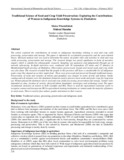Please use this identifier to cite or link to this item:
https://cris.library.msu.ac.zw//handle/11408/867Full metadata record
| DC Field | Value | Language |
|---|---|---|
| dc.contributor.author | Matsa, Winniefridah | - |
| dc.contributor.author | Mukoni, Manuku | - |
| dc.date.accessioned | 2016-04-16T14:40:54Z | - |
| dc.date.available | 2016-04-16T14:40:54Z | - |
| dc.date.issued | 2013-02 | - |
| dc.identifier.issn | 2070-3783 | - |
| dc.identifier.uri | http://hdl.handle.net/11408/867 | - |
| dc.description.abstract | The article explored the contributions of women to indigenous knowledge relating to seed and crop yield processing, preservation and storage. The paper is informed by eco-feminist perspective and the post-colonial theory. Harvard analysis tool was used to determine the nature of gender roles and activities in seed and crop yields processing, preservation and storage. The research design was purely qualitative in form of narrative enquiry which is suitable for ethnographic research. Sampling was purposive and judgemental through use of network referencing. In-depth interviews were conducted with 50 respondents (23 males and 27 females) in Matabeleland South province of Zimbabwe. Observation of processed, treated and stored seeds and crop yields was also done. The research revealed that the people in this province still have a considerable list of indigenous grain crops they depend on as their staple food. These were processed and preserved through traditional means. Preservation of seeds and varieties of melons and pumpkins was cheaper in terms of time and labour. Smoke coating and ash mixtures were the dominant chemicals used to preserve most seeds and grain crops for long-term use. Women played the dominant role in seed and crop yields processing, preservation and storage. Gender roles depended on time, location of activity, physical labour demanded, stereotypes and technology used. The paper recommends inclusion of women in both scientific and IKS. There is need for agricultural extension works to recognise women and incorporate IKS in agricultural training institutions as women make the majority of farmers in rural areas. There is need to fuse culture, gender and nature in their courses. | en_US |
| dc.language.iso | en | en_US |
| dc.publisher | World Academy of Science, Engineering and Technology | en_US |
| dc.relation.ispartofseries | International Journal of Humanities and Social Science;Vol. 3 No. 4; p. 234-245 | - |
| dc.subject | Traditional science, processing, preservation and indigenous seeds. | en_US |
| dc.title | Traditional science of seed and crop yield preservation: exploring the contributions of women to indigenous knowledge systems in Zimbabwe | en_US |
| dc.type | Article | en_US |
| item.fulltext | With Fulltext | - |
| item.cerifentitytype | Publications | - |
| item.languageiso639-1 | en | - |
| item.grantfulltext | open | - |
| item.openairecristype | http://purl.org/coar/resource_type/c_18cf | - |
| item.openairetype | Article | - |
| Appears in Collections: | Research Papers | |
Files in This Item:
| File | Description | Size | Format | |
|---|---|---|---|---|
| traditional science.pdf | 206.01 kB | Adobe PDF |  View/Open |
Items in MSUIR are protected by copyright, with all rights reserved, unless otherwise indicated.



